
The Crimean War was fought from October 1853 to February 1856 between the Russian Empire and an ultimately victorious alliance of the Ottoman Empire, France, the United Kingdom, and Sardinia-Piedmont.
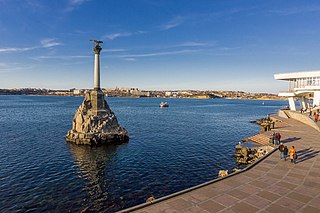
Sevastopol, sometimes written Sebastopol, is the largest city in Crimea and a major port on the Black Sea. Due to its strategic location and the navigability of the city's harbours, Sevastopol has been an important port and naval base throughout its history. Since the city's founding in 1783 it has been a major base for Russia's Black Sea Fleet. During the Cold War of the 20th century, it was a closed city. The total administrative area is 864 square kilometres (334 sq mi) and includes a significant amount of rural land. The urban population, largely concentrated around Sevastopol Bay, is 479,394, and the total population is 547,820.

The Battle of the Alma took place during the Crimean War between an allied expeditionary force and Russian forces defending the Crimean Peninsula on 20 September 1854. The allies had made a surprise landing in Crimea on 14 September. The allied commanders, Maréchal Jacques Leroy de Saint-Arnaud and Lord Raglan, then marched toward the strategically important port city of Sevastopol, 45 km (28 mi) away. Russian commander Prince Alexander Sergeyevich Menshikov rushed his available forces to the last natural defensive position before the city, the Alma Heights, south of the Alma River.

The Battle of the Chernaya was fought by the Chyornaya River during the Crimean War on August 16, 1855. The battle was fought between Russian troops and French and Piedmontese troops. The Chyornaya River is on the outskirts of Sevastopol. The battle ended in a Russian retreat and a victory for the French and Piedmontese.

Crimea is a peninsula in Eastern Europe, on the northern coast of the Black Sea, almost entirely surrounded by the Black Sea and the smaller Sea of Azov. The Isthmus of Perekop connects the peninsula to Kherson Oblast in mainland Ukraine. To the east, the Crimean Bridge, constructed in 2018, spans the Strait of Kerch, linking the peninsula with Krasnodar Krai in Russia. The Arabat Spit, located to the northeast, is a narrow strip of land that separates the Syvash lagoons from the Sea of Azov. Across the Black Sea to the west lies Romania and to the south is Turkey. The population is 2.4 million, and the largest city is Sevastopol. The region has been under Russian occupation since 2014.

The Treaty of Paris of 1856 brought an end to the Crimean War between the Russian Empire and an alliance of the Ottoman Empire, the United Kingdom, the Second French Empire and the Kingdom of Sardinia.

Crimean Tatars or Crimeans are a Turkic ethnic group and nation native to Crimea. The formation and ethnogenesis of Crimean Tatars occurred during the 13th–17th centuries, uniting Cumans, who appeared in Crimea in the 10th century, with other peoples who had inhabited Crimea since ancient times and gradually underwent Tatarization, including Ukrainian Greeks, Italians, Ottoman Turks, Goths, Sarmatians and many others. Despite the popular misconception, Crimean Tatars are not a diaspora of or subgroup of the Tatars.

The siege of Sevastopol lasted from October 1854 until September 1855, during the Crimean War. The allies landed at Eupatoria on 14 September 1854, intending to make a triumphal march to Sevastopol, the capital of the Crimea, with 50,000 men. Major battles along the way were Alma, Balaklava, Inkerman, Tchernaya, Redan, and, finally, Malakoff. During the siege, the allied navy undertook six bombardments of the capital, on 17 October 1854; and on 9 April, 6 June, 17 June, 17 August, and 5 September 1855.

Orlando Guy Figes is a British historian and writer. He was Professor of History at Birkbeck College, University of London, where he was made Emeritus Professor on his retirement in 2022.
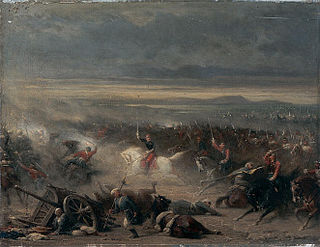
The Battle of Eupatoria occurred on 17 February 1855 during the Crimean War when the army of the Russian Empire unsuccessfully attempted to capture the Crimean port city of Eupatoria held by the forces of the Ottoman Empire.

The Crimea Medal was a campaign medal approved on 15 December 1854, for issue to officers and men of British units which fought in the Crimean War of 1854–56 against Russia. The medal was awarded with the British version of the Turkish Crimea Medal, but when a consignment of these was lost at sea, some troops received the Sardinian version.

The recorded history of the Crimean Peninsula, historically known as Tauris, Taurica, and the Tauric Chersonese, begins around the 5th century BCE when several Greek colonies were established along its coast, the most important of which was Chersonesos near modern day Sevastopol, with Scythians and Tauri in the hinterland to the north. The southern coast gradually consolidated into the Bosporan Kingdom which was annexed by Pontus and then became a client kingdom of Rome. The south coast remained Greek in culture for almost two thousand years including under Roman successor states, the Byzantine Empire (341–1204), the Empire of Trebizond (1204–1461), and the independent Principality of Theodoro. In the 13th century, some Crimean port cities were controlled by the Venetians and by the Genovese, but the interior was much less stable, enduring a long series of conquests and invasions. In the medieval period, it was partially conquered by Kievan Rus' whose prince Vladimir the Great was baptised at Sevastopol, which marked the beginning of the Christianization of Kievan Rus'. During the Mongol invasion of Europe, the north and centre of Crimea fell to the Mongol Golden Horde, and in the 1440s the Crimean Khanate formed out of the collapse of the horde but quite rapidly itself became subject to the Ottoman Empire, which also conquered the coastal areas which had kept independent of the Khanate. A major source of prosperity in these times was frequent raids into Russia for slaves.
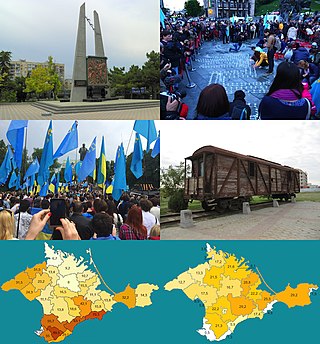
The deportation of the Crimean Tatars or the Sürgünlik ('exile') was the ethnic cleansing and the cultural genocide of at least 191,044 Crimean Tatars which was carried out by Soviet Union authorities from 18 to 20 May 1944, supervised by Lavrentiy Beria, chief of Soviet state security and the secret police, and ordered by the Soviet leader Joseph Stalin. Within those three days, the NKVD used cattle trains to deport the Crimean Tatars, mostly women, children, and the elderly, even Communist Party members and Red Army members, to the Uzbek SSR, several thousand kilometres away. They constituted one of the several ethnicities which were subjected to Stalin's policy of population transfer in the Soviet Union.
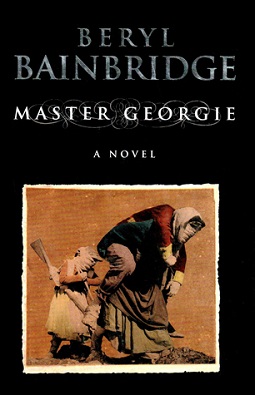
Master Georgie is a 1998 historical novel by English novelist Beryl Bainbridge. It deals with the British experience of the Crimean War through the adventures of the eponymous central character George Hardy, who volunteers to work on the battlefields.

The Crimean Bridge, also called Kerch Strait Bridge or Kerch Bridge, is a pair of parallel bridges, one for a four-lane road and one for a double-track railway, spanning the Kerch Strait between the Taman Peninsula of Krasnodar Krai in Russia and the Kerch Peninsula of Crimea. Built by the Russian Federation after its annexation of Crimea at the start of 2014, the bridge cost ₽227.92 billion (US$3.7 billion) and has a length of 19 km (12 mi), making it the longest bridge in Europe and the longest bridge ever constructed by Russia.

The Autonomous Republic of Crimea is an administrative division of Ukraine encompassing most of Crimea that was unilaterally annexed by Russia in 2014. The Autonomous Republic of Crimea occupies most of the peninsula, while the City of Sevastopol occupies the rest.

In February and March 2014, Russia invaded the Crimean Peninsula, part of Ukraine, and then annexed it. This took place in the relative power vacuum immediately following the Revolution of Dignity. It marked the beginning of the Russo-Ukrainian War.

The Republic of Crimea is a republic of Russia, comprising most of the Crimean Peninsula, but excluding Sevastopol. Its territory corresponds to the pre-2023 territory of the Autonomous Republic of Crimea, a de jure subdivision of Ukraine. Russia occupied and annexed the peninsula in 2014, although the annexation remains internationally unrecognized.

Oliver Bullough is a British writer.
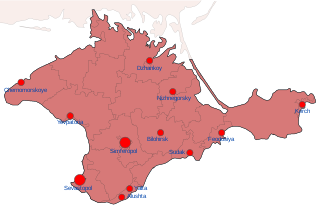
On 27 February 2014, unmarked Russian soldiers were deployed to the Crimean Peninsula in order to wrest control of it from Ukraine, triggering the Russo-Ukrainian War. This military occupation, which the Ukrainian government considers to have begun on 20 February, laid the foundation for the Russian annexation of Crimea on 18 March 2014. Under Russia, the Ukrainian Autonomous Republic of Crimea was replaced by the Republic of Crimea, though the legitimacy of the latter is scarcely recognized internationally.




















